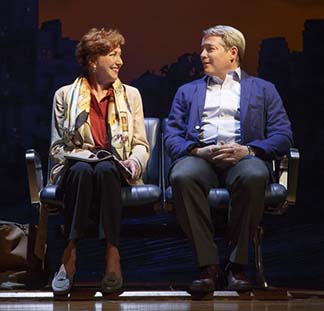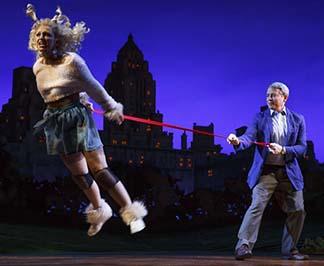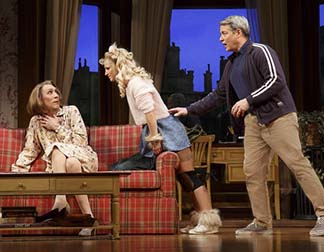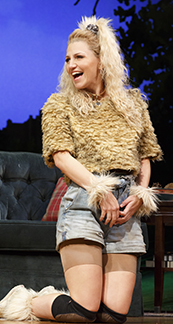By Lucy Komisar
A play one could expect to be very silly turns out to be entertaining, largely due to the smart acting of Annaleigh Ashford as a dog and the quirky light touch of director Daniel Sullivan. My companion was an actress who remembers how hard it was in acting classes to play such anthropomorphic characters. Ashford succeeds brilliantly, being at various times pert, bitchy, sexy and – well anything a human could be. But as I thought about that, I had some concerns.

In this play by A.R. Gurney, first produced off-Broadway in 1995, Sylvia is picked up in Central Park by Greg (Matthew Broderick). Broderick plays the same nerdy, spacey character with the same voice and inflection we have seen in his last umpteen plays, and it‘s getting pretty tiresome. But Ashford saves the day.
Greg and his wife Kate (the fine Julie White) live on Central Park West. She, shown to be a very competent woman, more together than her husband, is a teacher who is developing a plan to teach Shakespeare to inner city kids. Greg is unhappy at work, has had a fight with his boss and taken off for the park. We learn later that as he sat on a bench, Sylvia jumped into his lap.

He takes Sylvia home and there shows more interest in the dog than in Kate, who becomes understandably annoyed. Especially when Sylvia leaves a puddle on the floor and hairs on the couch. And gets in the way of their life which, now the kids are in college, includes dinners out, concerts, Knicks games etc.
Ashford is wonderful as the dog, who tells Greg, “I love you, I think you‘re god.” [I thought I hope Sylvia is channeling dogs and not women.] Her bark is “hey, hey, hey!” Her body language is twitchy. When Greg says she is a French poodle, she breaks into “La vie en rose.” Kate routinely gives us lines from Shakespeare. Of course, there will be “Who is Sylvia?”

Kate isn‘t the only wife with a problematic spouse. Her Vassar classmate Phyllis (terrifically played by the angular Robert Sella, who also does two male roles) says she is on the wagon and declares that “liquor is the curse of our generation and our ethnic group.” But she has a very good excuse to fall off the wagon. She complains that her husband has adopted a goldfish that he takes into his bathtub. We don’t learn if the fish has a name.
A discomforting moment occurs when Sylvia repeatedly nuzzles Phyllis‘ crotch, to that lady‘s great consternation. When Sylvia wants to sleep in Greg and Kate’s bed, Kate proclaims, “I hate Sylvia. I never thought I could hate anyone except Nixon.” Crotch? Bed? Is Sylvia asserting her sexual power? In a way that puts down those women?

A major challenge arrives when Kate gets a grant to study in England and the dog can‘t come because of the six-month quarantine. But Kate had followed Greg for 20 years, isn‘t it his turn? Feminism, right? The more I thought about it, beyond the surface comedy, I realized there is an underlying anti-woman note here — female dog thinks Greg is god, his own wife is wrapped up in her career, Phyllis, played by a man, is flaky, both women seem targets of the dog.
Gurney says the play is about the need to connect. Is this really about the human condition, interpreted with the help of a deus ex machina mutt? So that if your job is not satisfying, leave it and find a pooch in the park who thinks you are god? Or whatever that signifies? Is Sylvia his fantasy woman? And how about Kate’s need to connect? I didn’t like the politics of the play, but I did relish Ashford in a performance that is a great model for acting classes.
“Sylvia.” Written by A.R. Gurney; directed by Daniel Sullivan. Cort Theatre, 138 West 48th Street, New York City. 800-447-7400. Opened Oct 27, 2015; closes Jan 3, 2016. Discount to Dec 23 with code, SVNSA814, orchestra $55 (reg $89 to $147), balcony $32 (reg $32 to $67). 11/18/15.

